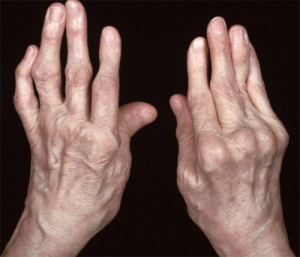 Studies have been conducted and supported the hypothesis that dietary omega 3 fats may have a preventive effect in rheumatoid arthritis. For example, the Japanese, whose diet is rich in seafood, have a comparatively high frequency of the rheumatoid arthritis vulnerability `shared epitope’ conferred by certain HLA-DRBI alleles compared to Western populations. By contrast, the prevalence of rheumatoid arthritis in the Japanese appears to be only one third that of their Western counterparts. Among Greenland Inuits, who feed on sea mammals and fish, the frequency of the rheumatoid susceptibility allele HLA-DR(3I 0401 is similar to that of Europeans, but rheumatoid arthritis is rare. There is an important warning regarding these population studies. Genetic predispositions are multifactorial and other genetic factors, unrelated to HLA, may militate against the occurrence of polyarthritis.
Studies have been conducted and supported the hypothesis that dietary omega 3 fats may have a preventive effect in rheumatoid arthritis. For example, the Japanese, whose diet is rich in seafood, have a comparatively high frequency of the rheumatoid arthritis vulnerability `shared epitope’ conferred by certain HLA-DRBI alleles compared to Western populations. By contrast, the prevalence of rheumatoid arthritis in the Japanese appears to be only one third that of their Western counterparts. Among Greenland Inuits, who feed on sea mammals and fish, the frequency of the rheumatoid susceptibility allele HLA-DR(3I 0401 is similar to that of Europeans, but rheumatoid arthritis is rare. There is an important warning regarding these population studies. Genetic predispositions are multifactorial and other genetic factors, unrelated to HLA, may militate against the occurrence of polyarthritis.
More direct support for a preventive effect of dietary omega 3 fats comes from the Seattle Women’s Health Study. In this case control study, women consuming two or more servings of fish per week had an odds ratio of 0.32 for development of rheumatoid factor positive rheumatoid arthritis compared to subjects consuming less than one serving of fish per week.
Collectively, animal, population and case control studies suggest a preventive effect of dietary omega 3 fats on rheumatoid arthritis that could be as high as a two-thirds reduction in disease occurrence. This equates to a very substantial reduction in disease burden imposed by a disease that affects more than 1 % of the population in countries that have a high fat intake, comprising much omega 6 and little omega 3 fats. In China, where average fat intakes are lower, the prevalence of rheumatoid arthritis appears to be about one third of 1% and the impact of omega 3 fat intakes on disease prevalence may differ. The amount of omega 3 fat required for a preventive effect may be less than that used to achieve anti-inflammatory effects in established rheumatoid arthritis.
“Influence of omega-3 fatty acids on the prostaglandin-metabolism in healthy volunteers … synergistic effect of n-6 and n-3 fatty acids at low doses which is greater than the effect of high doses of n-3 fatty acids alone.” Prostaglandins in the Cardiovascular System, 1992.
Mike Maunu – Founder
Oxygen4Life.com
